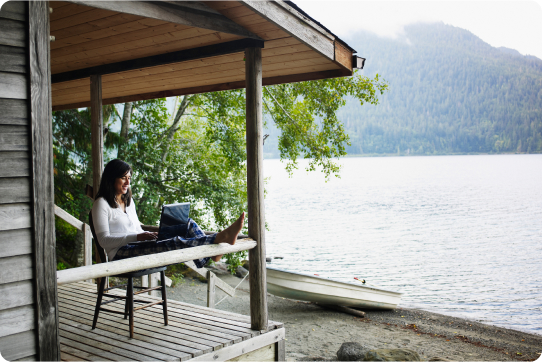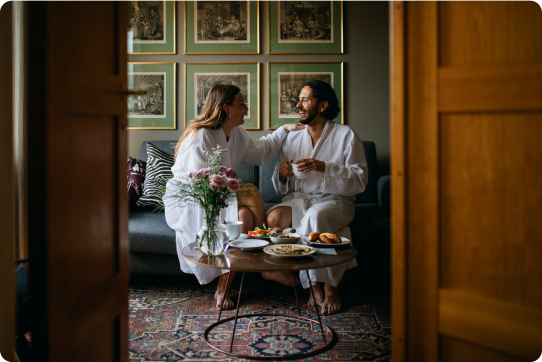Our community guidelines
Respect
As part of our mission to make it easier for everyone to experience the world, we’re committed to doing everything we can to eliminate all forms of unlawful bias, discrimination, intolerance, harassment and abuse on our platforms. Our anti-discrimination policy ensures we have processes in place to protect you, your guests, your staff and your property. We want all our customers to feel safe and respected. Behaviour promoting violence, discriminatory language or hatred against a person or group based on who they are is unacceptable. This includes any form of discrimination, such as unfair or unequal treatment based on personal characteristics. These characteristics include race, colour, language, ethnicity, national or social origin, religion, political views, property ownership, sexual orientation, mental or physical abilities, gender, gender identity or expression, marital or familial status, health status, place of residence or social or economic status. Even in cases where you may have lawful or legitimate reasons for not accepting a booking, doing so may cause distress and hardship to guests. You should make every effort to be welcoming to guests of all backgrounds. You have a responsibility to ensure a safe environment and to prevent behaviours and practices that may cause, result in or are likely to lead to physical, psychological, sexual or economic harm. This includes – but isn’t limited to – gender and race-based violence, harassment and physical assault.
No one – whether partners, guests or prospective guests – should face unfair or unequal treatment based on, but not limited to, the following characteristics:
- Race, skin colour, language, ethnicity, national or social origin, religion, political views, whether or not they own property, sexual orientation, mental or physical abilities, gender, gender identity or expression, marital status or familial status, health status, place of residence or social or economic status.
- Actual or perceived disability, for example, by charging additional fees to a guest with disabilities (including pet fees when the guest has a service or assistance animal) or denying entry to a service or assistance animal.
- Actual or perceived age, for example, by charging additional fees to guests in a certain age group. But, you may set reasonable minimum age limits for guests checking in or staying at a property as long as those limits are universally applied to all guests, specified in the property policies on our platform and accepted under the applicable law.
- You may not subject individuals or a group of people to harassment, violence, or abuse of any form, including sexual harassment and any other gender-based violence.
- Additional resources for partners can be found here

Are you missing any information? /
Thank you for sharing
What information were you expecting to see on this page?
Thank you for sharing
Your feedback will help us improve this page for all our guests and partners.
Sorry, something went wrong. Please try again.
Safety
Physical Safety
We aim for an inclusive, global travel community, and we want our guests and partners to interact and share travel experiences with utmost respect, trust and safety. Every person has the right and expectation to have their physical well-being preserved and to be free from violence, harm or abuse. We take allegations of physical and sexual abuse extremely seriously. Such behaviour, which includes any actions that harm or threaten another person, is strictly prohibited as it violates our safety standards and guidelines.
The use of any items or chemical substances deemed as weapons or tools to facilitate unwanted behaviour, including actions intended to harm someone, also constitutes a breach of our community standards and guidelines. We expect our partners and their guests to prioritise the well-being and safety of everyone involved. You shouldn’t engage in or encourage behaviour that harms, threatens to harm or shows intent to harm any person or property.

Unacceptable behaviour includes – but isn’t limited to – the following:
- Physical abuse: physical altercations, intentional damage to the property and/or personal possessions, threats of physical violence and using physical force to get people to do something against their will.
- Using objects as weapons: threatening to or actually using an object to harm someone.
- Threats of violence: intimidating or threatening another person with physical harm or sexual activity, regardless of whether the threat is acted upon.
- Sexual abuse and misconduct: making unwanted comments or gestures, including soliciting sexual contact, displaying indecent material or indecent exposure, touching or kissing someone without explicit consent and sexual assault or threats of sexual assault.
- Non-consensual physical touching: any unwelcome physical contact, including groping, touching or any other form of sexual assault.
- Child sexual exploitation: actual or attempted exploitation for sexual purposes of minors and underage persons by abusing a position of vulnerability or trust.
- Human rights violations: discrimination based on personal characteristics, violent crimes, labour abuses, legal system violations and property-related issues such as forced evictions, land grabbing, etc.
- Modern slavery: infringement on the rights of others, including slavery, human trafficking, forced labour, debt bondage, descent-based slavery, servitude, child slavery and forced and early marriage.
Safety hazards
We take the safety and security of our guests and partners seriously. Partners have a duty of care to ensure that their property listings are free from hazards and provide a secure environment for guests. If you fail to maintain your property free of safety hazards, you put your guests and staff at potential risk. For the safety and well-being of all occupants, we expect that you, your staff and your guests exercise caution while on the premises to avoid creating any potential safety hazards.

Examples of behaviour that put guests and staff safety at risk include, but aren’t limited to:
- Neglecting repairs: ignoring or postponing essential repairs that can pose a risk to guests and staff, such as broken handrails, faulty wiring or leaks.
- Lack of safety equipment: the property lacks functional smoke alarms, carbon monoxide detectors, or fire safety equipment where required by local laws, regulations, and your agreement with us.
- Non-disclosure: failing to disclose potential risks associated with the property, such as construction sites within your property, absence of window guards in high-rise apartments or lack of fencing around pools.
- Blocked exits: obstructing or locking potential emergency exit routes, hindering safe evacuation in case of emergencies.
- Improper storage: storing hazardous materials or chemicals in easily accessible areas without proper labelling and safety precautions.
- Unsafe amenities: offering amenities such as hot tubs, pools, or saunas without safety measures or maintenance as per local and manufacturer regulations.
- Contaminated food or water: offering food or water without the proper safety and hygiene measures, which could result in intoxication, illness or death.
Animal Welfare
We don’t tolerate animal cruelty and exploitation. We only list properties or attractions if they meet specific criteria, such as zoos or aquariums that are members of accredited bodies. Partners must respect both domestic and wild animals, ensuring their living conditions meet our animal welfare standards.

Are you missing any information? /
Thank you for sharing
What information were you expecting to see on this page?
Thank you for sharing
Your feedback will help us improve this page for all our guests and partners.
Sorry, something went wrong. Please try again.
Privacy
The privacy of our partners and their guests is crucial to us. Adherence to our privacy policies helps build trust and ensure everyone feels safe.
Online privacy: we take privacy and data protection obligations seriously, which is in line with our applicable Privacy Statement. Everyone has a right to privacy while using or providing services on our platform.
Physical privacy: during an interaction, one should be mindful of other people's personal space, belongings, and personal information and respect their privacy. Intentional or unintentional intrusion of privacy is strictly prohibited. The concept of private space involves understanding and respecting boundaries to ensure a positive interaction that both parties are comfortable with. Here are some considerations to define a person's private space and data protection.
Physical space boundaries
- Guest’s private space: these are designated guest areas, and partners should clearly outline them. Examples of guest’s private spaces are bathrooms, bedrooms, hotel rooms, hostel beds, capsule beds or bedrooms full of capsule beds, or any other space rented exclusively by the guest.
- Partner's private space: these are designated partner areas that partners should outline and clearly communicate to travellers. We encourage setting up and sharing house rules to address privacy concerns. They should outline the areas where guests and partners can reasonably expect privacy.
Use of surveillance devices and CCTV
- Placement of surveillance devices: make sure any surveillance devices on your property are consistent with local laws and regulations, including, but not limited to, privacy laws. These devices should only be used for safety and monitoring in common areas, such as entrances, hallways, parking lots and public places.
- The devices mustn’t compromise guests' privacy. They mustn’t be installed in areas where guests expect privacy, such as the living room or kitchen in an exclusively rented property or a nudist pool, spa, or sauna. This Partner Hub article provides more information on surveillance device placement guidelines.
- Whenever partners have placed surveillance devices on their property, they must disclose them on their property profile so that guests can make well-informed decisions.
Examples of unacceptable behaviour include – but aren’t limited to – the following:
- Invading someone’s private space.
- Entering a private area or where privacy is expected without consent or knowledge.
- Placing hidden and/or undisclosed surveillance devices.
- Placing surveillance devices where there is an expectation of privacy.
- Recording or photographing without consent.
- Going through someone's personal belongings, for example:
- As a guest, any partner locked cupboard, mail, forgotten bag, purse, etc.
- As a partner, any guest's backpack, luggage, bag/purse, etc.
- Sharing information or threats to share private information or data about other persons

Data Protection
Unacceptable behaviour includes – but isn’t limited to – the following:
- Content that may put the privacy of our guests and other data subjects at increased risk, such as guests or partners erroneously sharing personal data about other persons, including but not limited to sensitive or special category personal data. This also includes credit card numbers, national identification numbers, driver's and other license numbers, addresses or any other information that isn’t publicly accessible.
- Irresponsible storage, use, or handling of personal data is unacceptable. Irresponsible storage refers to any practice or situation where sensitive information, such as guest data, is inadequately safeguarded or left vulnerable to unauthorised access. An example of this is leaving guest data visible in the lobby, where it could be easily viewed or accessed by individuals who shouldn’t have access to such information.
Are you missing any information? /
Thank you for sharing
What information were you expecting to see on this page?
Thank you for sharing
Your feedback will help us improve this page for all our guests and partners.
Sorry, something went wrong. Please try again.